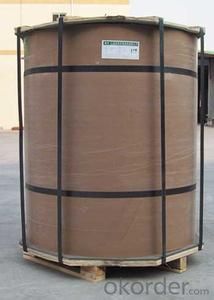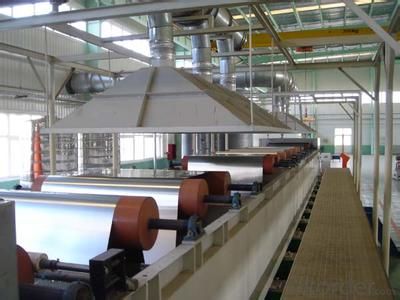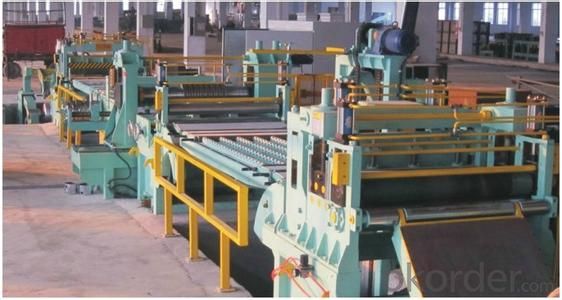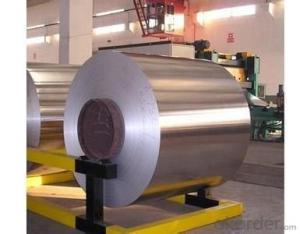Aluminum Coil- Alloy 1050 High Corrosion Resistance
- Loading Port:
- Shanghai
- Payment Terms:
- TT or LC
- Min Order Qty:
- 10 m.t.
- Supply Capability:
- 5000 m.t./month
OKorder Service Pledge
OKorder Financial Service
You Might Also Like
1. High Corrosion Resistance Aluminum Coil- Alloy 1050
Aluminum coil Alloy 1050 is formed when adding a little copper in it. Aluminum coil Alloy 1050 is widely used in the products which require a lower strength, such as chemical instrument, sheet product, deep drawing or spinning concave ware, the welding parts, heat exchanger, the clock and the disk surface, nameplate, kitchen ware, decoration, Reflective instruments, etc. Aluminum coil Alloy 1050 is easy to be processed, with the advantage of high corrosion resistance, good weldability, good electrical conductivity, and so on.
2. Main Features of the Aluminum coil - Alloy 1050
• High corrosion resistance
• Good weldability
• Good electrical conductivity
• Excellent forming characteristics
• Light weight
3.Aluminum Coil Alloy 1050 Images



4. Aluminum coil - Alloy 1050 Specification
Chemical component/% | |||||||||||
Alloy | Si | Fe | Cu | Mn | Mg | Cr | Ni | Zn | Ti | Zr | Al |
1050 | 0.25 | 0.40 | 0.05 | 0.05 | 0.05 | _ | _ | 0.05 | 0.03 | _ | 99.5 |
5.FAQ of Aluminum coil- Alloy 1050
We have organized several common questions for our clients,may help you sincerely:
1. What is your monthly quantity?
For Aluminum coil Alloy 1050, our production capacity is 5,000 tons per month.
2. When is your delivery time?
The delivery time for Aluminum coil Alloy 1050 will be around 30-45 days after receiving the down payment or original LC.
3. How to control the quality
We have professional QC to inspect in every processing of Aluminum coil Alloy 1050, if there is a problem with the products, we are not allowed to make shipments.
- Q:What are the different surface treatments for aluminum coils?
- There are several different surface treatments available for aluminum coils, each offering unique properties and benefits. Some common surface treatments for aluminum coils include: 1. Mill Finish: This is the untreated, raw surface of aluminum coils that comes directly from the mill. It has a slightly rough texture and is typically used in applications where aesthetics are not a primary concern. 2. Anodized Finish: Anodizing is an electrochemical process that creates a protective layer on the surface of the aluminum coil. This treatment enhances corrosion resistance, improves durability, and provides a wide range of color options. 3. Painted Finish: Aluminum coils can be coated with various paint systems to enhance their appearance and protect against corrosion. Painted finishes offer a wide range of colors, gloss levels, and textures, allowing for customization according to specific design requirements. 4. Polished Finish: Polishing is a mechanical process that creates a smooth and reflective surface on the aluminum coil. This treatment is often used in decorative applications, where a high-quality and aesthetically pleasing finish is desired. 5. Brushed Finish: Brushing involves mechanically brushing the surface of the aluminum coil to create a pattern of fine parallel lines. This treatment provides a unique texture and is commonly used in architectural and interior design applications. 6. Embossed Finish: Embossing is a process of creating raised or recessed patterns on the surface of the aluminum coil. This treatment adds texture, enhances strength, and can be used for decorative purposes or to improve grip in certain applications. 7. Laminated Finish: Lamination involves applying a layer of protective film or coating on the surface of the aluminum coil. This treatment provides additional protection against scratches, abrasion, and UV rays, making it suitable for outdoor applications. Each surface treatment option has its own advantages and is chosen based on the specific requirements of the application, such as corrosion resistance, durability, aesthetics, and functionality.
- Q:This is not for around the house. It is for my lab. I am pretty sure these one wires are Aluminum, but I need the connector they were made with and the power cable is copper. Would it be okay to still try to join the two.
- The main problem with aluminum wiring is cold creep. When aluminum wiring warms up, it expands. When it cools down, it contracts. Unlike copper, when aluminum goes through a number of warm/cool cycles it loses a bit of tightness each time. To make it worse, aluminum oxidizes, or corrodes when in contact with certain types of metal, so the resistance of the connection goes up. Which causes it to heat up and corrode/oxidize still more. Eventually the wire starts getting very hot, the insulation melts or it damages the fixture it's attached to, and possibly even cause a fire. Anything attached to aluminum wiring should be rated for it. It will be stamped with Al/Cu or CO/ALR. Wires should be properly connected (at least 3/4 way around the screw in a clockwise direction). Connections should be very tight. Any connections using push-in terminals should be redone with the proper screw connections. Connections between aluminum and copper wire need to be handled specially. The NEC requires that the wire be connected together using special crimp devices, with a special anti-oxidant grease. The tools and materials for this are expensive - not practical to do it yourself unless you can borrow the tool. Good luck.
- Q:How do aluminum coils contribute to sustainable and green building practices?
- Aluminum coils contribute to sustainable and green building practices in several ways. Firstly, aluminum is a highly recyclable material, allowing for the reuse of aluminum coils in various applications, reducing waste and conserving natural resources. Additionally, aluminum is lightweight, which reduces transportation energy and costs during installation. Furthermore, aluminum coils have exceptional durability and corrosion resistance, resulting in longer lifespan and reduced maintenance needs. This longevity contributes to the overall sustainability of buildings, as they require fewer replacements and repairs. Lastly, aluminum is an energy-efficient material, as it has excellent thermal conductivity, allowing for better insulation and reduced energy consumption for heating and cooling purposes. Overall, the use of aluminum coils promotes sustainability, resource conservation, energy efficiency, and reduced environmental impact in green building practices.
- Q:What is the typical fatigue strength of aluminum coils?
- The typical fatigue strength of aluminum coils varies depending on various factors such as the alloy used, the manufacturing process, and the specific application. However, in general, aluminum coils have relatively high fatigue strength compared to other materials, making them suitable for applications where repeated cyclic loading is involved.
- Q:Are aluminum coils suitable for high-temperature applications?
- High-temperature applications are generally not suitable for aluminum coils due to their low melting point of approximately 660 degrees Celsius (1220 degrees Fahrenheit). Aluminum, despite its advantageous properties like lightweight and corrosion resistance, cannot withstand the extreme heat associated with such environments. In contrast, materials with higher melting points like stainless steel or nickel alloys are often preferred for high-temperature settings. These materials can endure higher temperatures without compromising their structural integrity or experiencing significant deformation. However, it is important to note that certain aluminum alloys have been developed to possess improved high-temperature properties. These alloys incorporate elements like copper, magnesium, or zinc, which enhance their strength and heat resistance. As a result, these specialized aluminum alloys may be suitable for specific high-temperature applications that require their unique properties. To summarize, standard aluminum coils may not be appropriate for high-temperature applications, but specialized aluminum alloys are available to offer better performance in elevated temperature environments. It is crucial to consider the specific temperature requirements and consult experts to determine the most suitable material for a particular high-temperature application.
- Q:Are aluminum coils suitable for high-strength applications?
- No, aluminum coils are not typically suitable for high-strength applications. Aluminum has lower tensile strength compared to other metals like steel, making it less ideal for high-stress or heavy-duty applications where strength is a critical factor.
- Q:What is the coefficient of thermal expansion of aluminum coils?
- The coefficient of thermal expansion of aluminum coils is typically around 23 x 10^-6 per degree Celsius.
- Q:Im trying to make a aluminum ring. I want it to be rock hard. PLZZAnswers that work get best answer
- use a hard alloy like 7075 and heat treat it
- Q:How are aluminum coils used in heating, ventilation, and air conditioning (HVAC) systems?
- Aluminum coils are commonly used in HVAC systems as they serve as heat exchangers. These coils are responsible for transferring heat between the indoor and outdoor units of an HVAC system. The aluminum coils are designed to efficiently absorb heat from the indoor air and release it outside, or vice versa, depending on whether the system is in cooling or heating mode. The use of aluminum coils in HVAC systems ensures better heat transfer, corrosion resistance, and overall system performance.
- Q:I was told today that taking aluminium inside your body greatly increases the chance of getting alzheimers as they destroy cells. Is this true?If so, then what foods contain aluminium?Thanks in advance :)
- I hadn't heard of any specific foods, but I have heard that deodorants that have aluminum in them had been linked to Alzheimers.
1. Manufacturer Overview |
|
|---|---|
| Location | |
| Year Established | |
| Annual Output Value | |
| Main Markets | |
| Company Certifications | |
2. Manufacturer Certificates |
|
|---|---|
| a) Certification Name | |
| Range | |
| Reference | |
| Validity Period | |
3. Manufacturer Capability |
|
|---|---|
| a)Trade Capacity | |
| Nearest Port | |
| Export Percentage | |
| No.of Employees in Trade Department | |
| Language Spoken: | |
| b)Factory Information | |
| Factory Size: | |
| No. of Production Lines | |
| Contract Manufacturing | |
| Product Price Range | |
Send your message to us
Aluminum Coil- Alloy 1050 High Corrosion Resistance
- Loading Port:
- Shanghai
- Payment Terms:
- TT or LC
- Min Order Qty:
- 10 m.t.
- Supply Capability:
- 5000 m.t./month
OKorder Service Pledge
OKorder Financial Service
Similar products
New products
Hot products
Related keywords





























